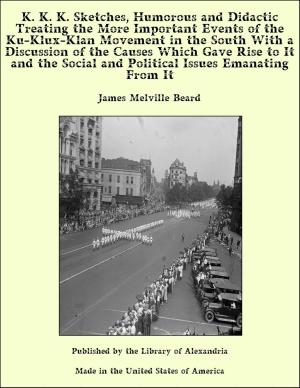Heralds of Empire: Being the Story of One Ramsay Stanhope, Lieutenant to Pierre Radisson in the Northern Fur Trade
Nonfiction, Religion & Spirituality, New Age, History, Fiction & Literature| Author: | Agnes Christina Laut | ISBN: | 9781465508522 |
| Publisher: | Library of Alexandria | Publication: | March 8, 2015 |
| Imprint: | Language: | English |
| Author: | Agnes Christina Laut |
| ISBN: | 9781465508522 |
| Publisher: | Library of Alexandria |
| Publication: | March 8, 2015 |
| Imprint: | |
| Language: | English |
I see him yet—swarthy, straight as a lance, keen as steel, in his eyes the restless fire that leaps to red when sword cuts sword. I see him yet—beating about the high seas, a lone adventurer, tracking forest wastes where no man else dare go, pitting his wit against the intrigue of king and court and empire. Prince of pathfinders, prince of pioneers, prince of gamesters, he played the game for love of the game, caring never a rush for the gold which pawns Other men's souls. How much of good was in his ill, how much of ill in his good, let his life declare! He played fast and loose with truth, I know, till all the world played fast and loose with him. He juggled with empires as with puppets, but he died not a groat the richer, which is better record than greater men can boast. Of enemies, Sieur Radisson had a-plenty, for which, methinks, he had that lying tongue of his to thank. Old France and New France, Old England and New England, would have paid a price for his head; but Pierre Radisson's head held afar too much cunning for any hang-dog of an assassin to try "fall-back, fall-edge" on him. In spite of all the malice with which his enemies fouled him living and dead, Sieur Radisson was never the common buccaneer which your cheap pamphleteers have painted him; though, i' faith, buccaneers stood high enough in my day, when Prince Rupert himself turned robber and pirate of the high seas. Pierre Radisson held his title of nobility from the king; so did all those young noblemen who went with him to the north, as may be seen from M. Colbert's papers in the records de la marine. Nor was the disembarking of furs at Isle Percée an attempt to steal M. de la Chesnaye's cargo, as slanderers would have us believe, but a way of escape from those vampires sucking the life-blood of New France—the farmers of the revenue. Indeed, His Most Christian Majesty himself commanded those robber rulers of Quebec to desist from meddling with the northern adventurers. And if some gentleman who has never been farther from city cobblestones than to ride afield with the hounds or take waters at foreign baths, should protest that no maid was ever in so desolate a case as Mistress Hortense, I answer there are to-day many in the same region keeping themselves pure as pond-lilies in a brackish pool, at the forts of their fathers and husbands in the fur-trading country. [1] And as memory looks back to those far days, there is another—a poor, shambling, mean-spoken, mean-clad fellow, with the scars of convict gyves on his wrists and the dumb love of a faithful spaniel in his eyes. Compare these two as I may—Pierre Radisson, the explorer with fame like a meteor that drops in the dark; Jack Battle, the wharf-rat—for the life of me I cannot tell which memory grips the more. One played the game, the Other paid the pawn. Both were misunderstood. One took no thought but of self; the Other, no thought of self at all. But where the great man won glory that was a target for envy, the poor sailor lad garnered quiet happiness
I see him yet—swarthy, straight as a lance, keen as steel, in his eyes the restless fire that leaps to red when sword cuts sword. I see him yet—beating about the high seas, a lone adventurer, tracking forest wastes where no man else dare go, pitting his wit against the intrigue of king and court and empire. Prince of pathfinders, prince of pioneers, prince of gamesters, he played the game for love of the game, caring never a rush for the gold which pawns Other men's souls. How much of good was in his ill, how much of ill in his good, let his life declare! He played fast and loose with truth, I know, till all the world played fast and loose with him. He juggled with empires as with puppets, but he died not a groat the richer, which is better record than greater men can boast. Of enemies, Sieur Radisson had a-plenty, for which, methinks, he had that lying tongue of his to thank. Old France and New France, Old England and New England, would have paid a price for his head; but Pierre Radisson's head held afar too much cunning for any hang-dog of an assassin to try "fall-back, fall-edge" on him. In spite of all the malice with which his enemies fouled him living and dead, Sieur Radisson was never the common buccaneer which your cheap pamphleteers have painted him; though, i' faith, buccaneers stood high enough in my day, when Prince Rupert himself turned robber and pirate of the high seas. Pierre Radisson held his title of nobility from the king; so did all those young noblemen who went with him to the north, as may be seen from M. Colbert's papers in the records de la marine. Nor was the disembarking of furs at Isle Percée an attempt to steal M. de la Chesnaye's cargo, as slanderers would have us believe, but a way of escape from those vampires sucking the life-blood of New France—the farmers of the revenue. Indeed, His Most Christian Majesty himself commanded those robber rulers of Quebec to desist from meddling with the northern adventurers. And if some gentleman who has never been farther from city cobblestones than to ride afield with the hounds or take waters at foreign baths, should protest that no maid was ever in so desolate a case as Mistress Hortense, I answer there are to-day many in the same region keeping themselves pure as pond-lilies in a brackish pool, at the forts of their fathers and husbands in the fur-trading country. [1] And as memory looks back to those far days, there is another—a poor, shambling, mean-spoken, mean-clad fellow, with the scars of convict gyves on his wrists and the dumb love of a faithful spaniel in his eyes. Compare these two as I may—Pierre Radisson, the explorer with fame like a meteor that drops in the dark; Jack Battle, the wharf-rat—for the life of me I cannot tell which memory grips the more. One played the game, the Other paid the pawn. Both were misunderstood. One took no thought but of self; the Other, no thought of self at all. But where the great man won glory that was a target for envy, the poor sailor lad garnered quiet happiness















